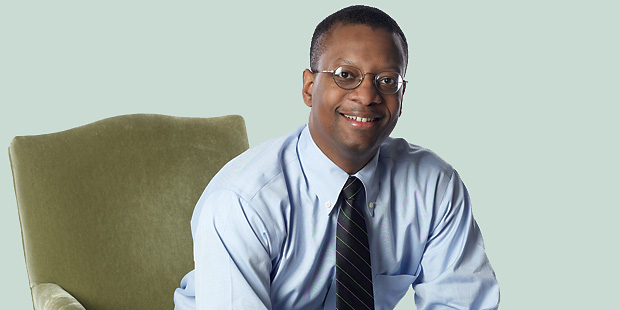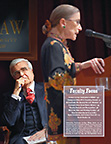Introducing Troy McKenzie
Assistant Professor of Law
Printer Friendly VersionIn 1999, when Regis Philbin’s Who Wants to Be a Millionaire hit the airwaves, New York University Law Review students agreed that, should they ever land on the show, Troy McKenzie ’00 would be the first person they’d pick to be their “lifeline,” a friend they could call with an all-time stumper of a question. “He’s a walking Google,” says Carol Kaplan ’00, now an associate at Paul, Weiss, Rifkind, Wharton & Garrison in New York. Once, she, McKenzie and other friends were talking about a case involving the Pennsylvania Railroad, she recalls, and “Troy went off on a riff about different train manufacturers, different gauges of tracks, eras when trains were used—facts, figures and offbeat information.”
Those who know him say his encyclopedic knowledge of everything from kites to electronics, coupled with perfect comedic timing, will stand him in good stead in the classroom. “With a wonderfully placed bon mot,” Kaplan says, “he makes his friends convulse with laughter. That’s a great asset for a professor.”
McKenzie will teach civil procedure—in, perhaps, the same classroom where he was a first-year student exactly 10 years ago. “It makes you feel like you’ve accomplished something, stepping back into the same forum but on the other side of the table,” he says. But “it’s an odd feeling, a sense of familiarity and newness at the same time.”
McKenzie, 32, will become the fifth professor of the Law School who is 35 or under. Still a bit uncomfortable with such a grownup salutation, he laughs when he’s addressed as “professor.” But Kaplan is not alone in thinking that McKenzie is a natural for the job.
“What’s striking about Troy is, this is a guy with real presence, unusual presence for someone who’s just 32 years old,” says William Nelson, the Judge Edward Weinfeld Professor of Law, who teaches legal history. Nelson recalls McKenzie’s job talk before the Law School’s Academic Personnel Committee. “He was dropped in the middle of a lion’s den,” he says, “and was extremely good on his feet. Just as he can get up in front of faculty members and not fall apart, he’ll be able to get up in front of students and put them at ease.” And with McKenzie having left Debevoise & Plimpton in Manhattan, where he specialized in bankruptcy litigation for the past three years, NYU will gain another practitioner. “He knows the importance of procedure and substantive law and will bring that real-world understanding to his students,” says Helen Hershkoff, Joel S. and Anne B. Ehrenkranz Professor of Law.
McKenzie is currently at work on a paper, “Judicial Independence, Autonomy, and the Bankruptcy Courts,” which examines the role of bankruptcy judges in the federal court system. Unlike other federal judges, bankruptcy judges do not enjoy the protections of Article III of the Constitution—namely, life tenure and compensation that can’t be diminished—but nonetheless hear cases in federal courts. Supreme Court doctrine and scholarly literature justify that departure, saying that, while bankruptcy cases require judges who have technical expertise, these cases are unlikely to generate the political pressures other federal judges may come under. Plus, bankruptcy cases can be appealed to Article III judges.
McKenzie questions both points. “Bankruptcy may be a specialized process,” he says, but “bankruptcy cases can involve a broad range of subject matters, including multibillion-dollar tort and contract claims.” He also argues that in practice, bankruptcy cases generate few appeals. In his long-term work, he intends to examine other aspects of the bankruptcy process as well as class actions and complex litigation, which have close connections to the bankruptcy process.
McKenzie, a native of Jamaica, moved to the United States in 1980 with his family, settling in New Jersey. His dad, Delroy, 63, a chemist, works at a dairy processing plant. His mom, Monica, a librarian (now deceased) brought home “tons of obscure books,” McKenzie recalls, which sparked his diverse interests. “I’d go through a different hobby every week.” When he was eight, he spent the summer building kites. At ten, he says, “I very scientifically studied every plant in our garden and ended up growing a pound-and-a-half tomato. I cycled through lots of ideas quickly.”
In 1993, he entered Princeton University to study chemical engineering. Sometime in his sophomore year, his roommate “dragged” him to a campus lecture given by U.S. Supreme Court Justice Antonin Scalia. “I liked the give-and-take style of argument,” McKenzie says. He took some prelaw courses but enjoyed the small classes in his major, and stuck with engineering.
Upon graduation, he turned down an engineering job at Union Carbide, fearing his future might be too dull, and entered NYU School of Law. “I got a first-rate education and fell in love with the place,” says McKenzie, who received an award for most outstanding Law Review Note—a paper about sovereign immunity in bankruptcy. Active in the Black Allied Law Students Association, he says: “Though the numbers of black students weren’t huge, there was definitely a sense of comfort.” After he earned his J.D., he clerked for Judge Pierre Leval of the U.S. Court of Appeals for the Second Circuit and then for U.S. Supreme Court Justice John Paul Stevens during the course of two terms.
While taking a 2005-06 sabbatical as a Furman Academic Fellow, McKenzie says, “I realized that I liked being in an academic environment. I liked the luxury of being able to think about problems on an extended basis.” His return to NYU gives him the chance to do just that.
—

